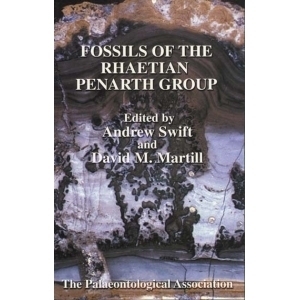
by A. Swift & D. M. Martill. 1999. 312 pp., 32 plates. [ISBN 0 901 702 65 X].
The Rhaetian Penarth Group includes the former Westbury Beds, Cotham Beds, and White Lias. It crops out in a narrow strip from the Devon and Dorset coast to the mouth of the Tees, and is particularly well known from the exposures along the Bristol Channel. This diverse suite of late Triassic sedimentary rocks is internationally famous for the fossils that it yields, most notably from the bone beds. Coverage is comprehensive, with separate chapters on foraminifera, gastropods, bivalves, crustaceans, insects, echinoderms, other invertebrates, conodonts, fish, tetrapods, trace fossils and plants. There are background chapters on sedimentology, stratigraphy and the formation of the bone beds. The guide is copiously illustrated with specimens from all major UK public collections of Penarth Group fossils illustrated on 26 plates and 30 text-figures. It will be of use both to collectors who want to know more about this diverse and interesting suite of fossils, as well as to students of of geology who wish to understand their conditions of deposition and accumulation